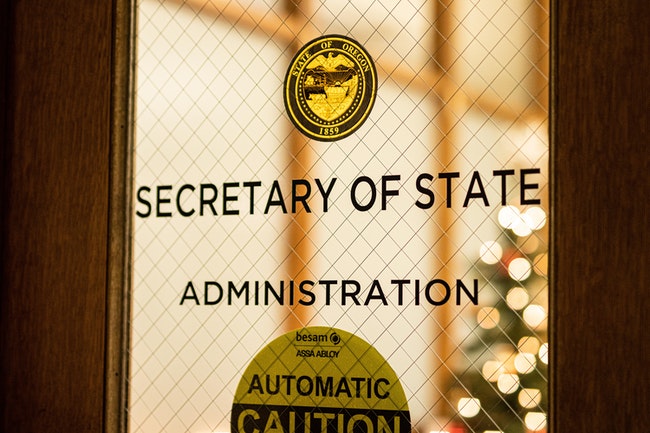 Secretary of State’s office. (Caleb Wolf/Special to Salem Reporter)
Secretary of State’s office. (Caleb Wolf/Special to Salem Reporter)
Changes to Oregon state administrative rules typically go unnoticed, but they are now the unusual setting for a new political conflict.
Our Oregon, a union-backed political group, is alarmed over a proposed change to the state’s election rules it says would give special interests excessive influence.
Steve Elzinga, a Salem attorney, said he proposed the rule change to prevent manipulation of a mechanism that allows citizens to try to stop new laws passed by legislators.
“It is highly ironic that a special interest group like Our Oregon is calling foul,” said Elzinga.
Our Oregon didn’t respond to a request for an interview. But in an email alert last week, the group called the proposal “an unconstitutional and unworkable rule change that threatens the integrity of our ballot.”
The opposing sides argue that they’re defending the ability of voters to directly access the state’s political system. With Democrats firmly in control of the Legislature, a citizen-driven referendum remains a tool for Republicans to prevent new laws they object to from taking root.
The voters most recently used that direct power in 2014, using a referendum to repeal a new law allowing residents to acquire driver’s licenses without providing proof they’re in the country legally.
In 2018, a group of Republican lawmakers unsuccessfully used a referendum to challenge the funding structure for an expansion of health care for low-income Oregonians. After lawmakers passed a landmark education funding bill last year, they passed additional bills that critics maintain were intended to stymie attempts to put the matter to a referendum.
The secretary of state’s office held a hearing on the rule change on Monday. A spokeswoman said in an email that Secretary of State Bev Clarno, a Republican, hasn’t reviewed the rule but could decide next month.
In Oregon, if citizens don’t like a new law passed by the Legislature they can put it to a statewide vote using the state’s referendum process. Unless a new law is written to take effect right away, citizens have 90 days after the Legislature adjourns to petition for a referendum on any part of the new. If the petition has the signatures of enough registered voters, the new law is placed on the ballot for voters to approve or reject. The number of signatures required to trigger a referendum is based on turnout in previous elections and is currently 74,680.
Last September, Elzinga asked the secretary of state’s office to change its rule so citizens could react quicker to pending laws. The change would permit collecting signatures for a referendum as soon as the targeted legislation passes both the House and the Senate. Under the current rules, signatures can’t be gathered until the governor signs legislation into law.
Governors have 30 business days after the Legislature adjourns to sign bills into law. Elzinga argued that a governor is concerned a bill might be subject to a referendum could delay signing it, chewing up some of the 90 days set aside for petition work.
The more compressed timeline makes it less likely enough signatures could be gathered to force a public vote.
“It’s about ensuring the integrity of the process and that grassroots petitioners have the right to vote,” he said.
In an email to supporters, Our Oregon said the rule change would create a legislative “logjam.”
“In short, this rule change would allow special interests to begin collecting signatures to repeal a bill before it even becomes law,” the organization wrote. “This makes no sense, and it would only increase the outsized power of industry lobbyists to interfere in our legislative process — at the expense of everyday Oregonians.”
Elzinga previously worked as governmental and legal affairs director for Republican Secretary of State Dennis Richardson, who died last year. Elzinga left the office afterward. He denied working on behalf of special interests and said that he wanted to carry on an initiative started by Richardson.
The rule change is also supported by Dan Meek, a longtime elections reform advocate, and Sal Peralta, a McMinnville city councilman.
While proponents of the rule change say that it’s needed to prevent governors from manipulating the referendum process, they couldn’t cite examples where that happened.
In 2017, state Reps. Mike Nearman and Bill Post, both Republicans, unsuccessfully attempted to subject a gun control bill to a referendum. But neither of them attributed the referendum’s failure to a delay by the governor.
Nearman said a bigger issue is lawmakers putting “emergency” provisions into bills so they go into effect immediately and are safeguarded from referendum. He said he is working on a ballot initiative for 2022 to address that issue.
Contact reporter Jake Thomas at 503-575-1251 or [email protected] or @jakethomas2009.









